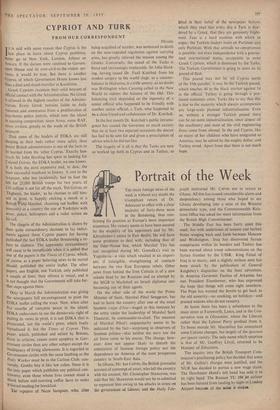CYPRIOT AND TURK
FROM OUR CORRESPONDENT IT is said with some reason that Cyprus is the last place to learn about Cyprus problems; better go to New York, London, Athens or Ankara. If the dictum were confined to Govern- ment House and its over-civil-to-the-visitor ser- vants, it would be true. But there is another Cyprus, of which Government House knows less than a deaf-and-dumb traveller in Kurdistan.
Greek Cypriots maintain their solid boycott of official contact with the Administration. No Greek is allowed in the highest reaches of the Adminis- tration. Every Greek remains liable to daily nuisance and annoyance from a proliferation of jeep-borne police patrols, which tour the island in seeming competition, some Army, some RAF, some civilian, greatly to the waste of the British taxpayer.
That some of the leaders of EOKA are still sleeping in their beds rather more safely than senior British administrators is one of the facts to be learned from the 'other Cyprus.' Exactly how much Sir John Harding has spent in looking for Colonel Grivas, the EOKA leader, no one knows. It is both the most expensive and, to date, the least successful manhunt in history. A cost to the taxpayer, who has incidentally had to foot the bill for 25,000 Briti-sh troops for two years, of £10 million is not far off the mark. Yet Grivas, or `Dighenis; the leader,' as he chooses to call him- self in print, is happily cocking a snook at a British Field-Marshal, churning out leaflets with immunity in a country the size of Yorkshire with army, police, helicopters and a radar screen on his tail.
The chagrin of the Administration is shown by their quite extraordinary decision to lay .indict- ments against three Cyprus papers for having Published the last EOKA leaflet threatening a re- turn to violence. The apparently extraordinary will cease to be inexplicable when it is added that one of the papers is the Times of Cyprus, which, of course, as a paper believing news to be sacred should, published the entire leaflet. The other Papers, one English, one Turkish, only published a couple of lines; their offence is venial, and it is not thought that the Government will take fur- ther steps against them.
Only in March the Administration was giving the newspapers full encouragement to print the EOKA leaflet calling the truce. Now, when after five months of complete peace in the island, EOKA endeavours to use the democratic right of Putting its views in print, it is not EOKA that is prosecuted, not the world's press, which freely reproduced it, but the Times of Cyprus. This Paper, which, published and edited by Britons, dares to criticise, causes more apoplexy in Gov- ernment circles than any other subject except the inadequacy of living allowances. It is regarded in Government circles with the same loathing as the Daily Worker must be in the Carlton Club; con- versely, Greeks buy it like hot cakes. Since it is the only paper which publishes any political con- troversy, even those whose lives cannot stand a shock before mid-morning coffee have to make it forced reading for breakfast.
The reprieve of Nicos Sampson, who, after
Nicosia being acquitted of murder, was sentenced to.death on the now-repealed regulation against carrying arms, has greatly relieved the tension among the Greeks. Conversely, the mood of the Turks is fierce and increasingly implacable. Sir John Hard- ing, having raised Dr. Fazil Kutchuk from his modest surgery to the world stage, as a counter- balance to M akarios, is a trifle uneasy, as no doubt was Wellington when Canning called in the New World to redress the balance of the Old. This balancing trick depended on the ingenuity of a senior official who happened to be friendly with another senior official, a Turk. who happened to be a close friend and collaborator of Dr. Kutchuk.
In the last month Dr. Kutchuk's public intransi- gence has caused the Governor so much anxiety that on at least two separate occasions the doctor has had to be sent for and given a prescription of advice which he did not like.
The tragedy of it all is that the Turks are now so worked up both in Cyprus and in Turkey, so blind in their belief of the newspaper fictions which they read that every day a Turk is mur- dered by a Greek, that they are genuinely fright- ened. Fear is a hard emotion with which to argue; the Turkish leaders insist on Partition and only Partition. With that attitude no compromise is possible; not even Independence with a guaran- teed international status, acceptable to most Greek Cypriots, which is dismissed by the Turks. The Turkish Government is going to insist on its pound of flesh.
This pound may not be 'all Cyprus north of the 35th parallel,' it may be the Turkish pound, which touches 40 in the black market against 14 in the official. Turkey is going through a pro- found economic crisis. Turks like to say that this is due to the austerity which always accompanies any large-scale planned industrialisation. Even so, without a stronger Turkish pound there can be no more industrialisation, since almost all the machinery and most of the civil engineering firms come from abroad. In the end Cyprus, like so many of her children who have emigrated to America, may be solved by the mighty dollar, and Turkey saved. Apart from that there is not much hope.






























 Previous page
Previous page